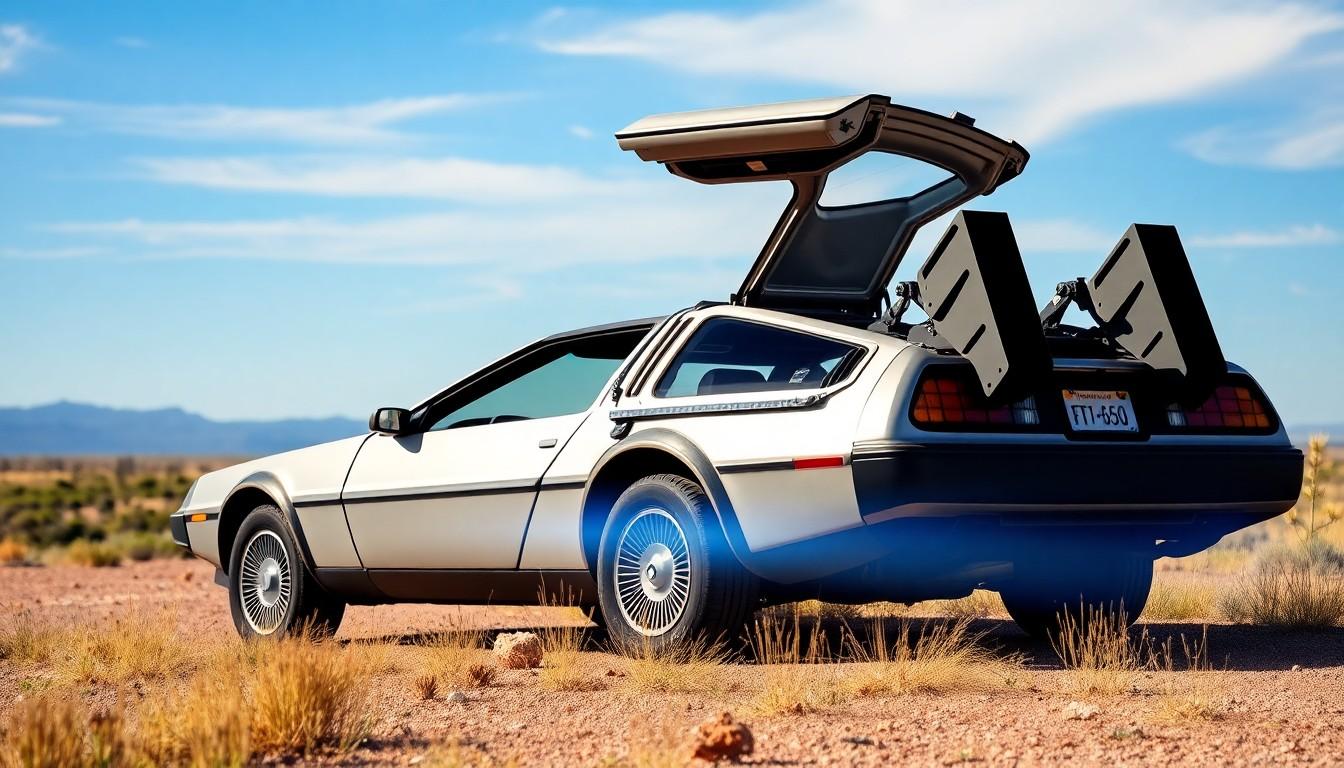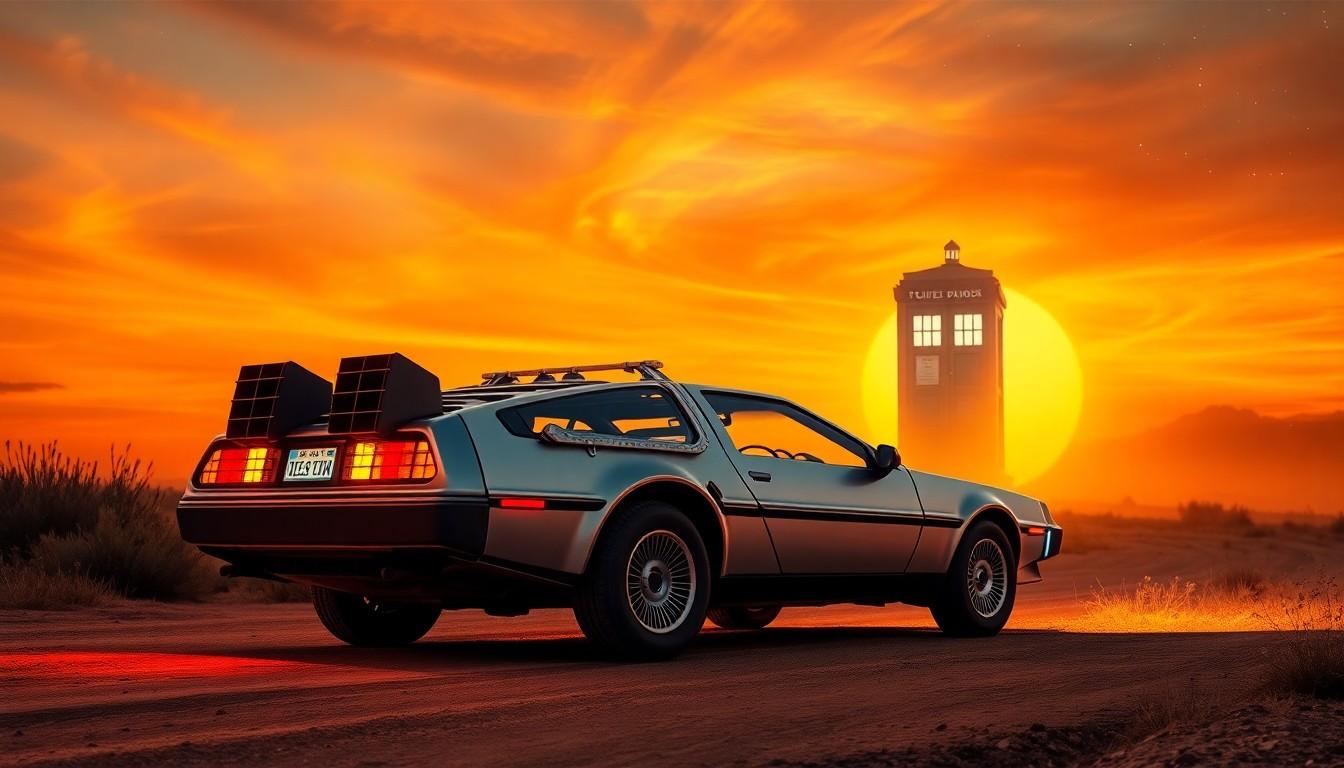Time travel movies have a unique charm that captivates audiences, whisking them away on thrilling journeys through past and future. Who hasn’t daydreamed about hopping into a DeLorean or a TARDIS, leaving their mundane reality behind? These films blend imagination and science, offering viewers a chance to explore “what if” scenarios that tickle the brain and tug at the heartstrings.
Table of Contents
ToggleOverview of Time Travel Movies
Time travel movies frequently explore complex narratives that challenge perceptions of reality. Audiences immerse themselves in these tales, experiencing the thrill of traversing different timelines. Classic examples like “Back to the Future” utilize imaginative concepts such as the DeLorean vehicle, which became an iconic symbol of time travel.
Innovative storytelling paves the way for the exploration of paradoxes and alternate realities. Films like “Interstellar” delve into the relationship between time and gravity, showcasing how these factors influence human experiences. The intricacies of time looping in movies such as “Groundhog Day” add another layer of intrigue, creating engaging narratives that captivate viewers.
In cinematic history, the genre has evolved significantly. Early films like “A Connecticut Yankee in King Arthur’s Court” set foundational elements for modern interpretations. A blend of science fiction and adventure propels stories that carry emotional weight while addressing profound themes.
Notably, television series such as “Doctor Who” also reflect the enduring fascination with time travel. Characters traverse not just historical moments but also grapple with moral dilemmas. Each episode presents fresh scenarios that keep audiences on the edge of their seats, emphasizing the genre’s versatility.
Moreover, innovative visual effects have enhanced the depiction of time travel. Films like “Tenet” utilize cutting-edge technology to provide stunning representations of complex temporal dynamics. Cinematic advancements continually redefine viewer expectations, ensuring this genre remains relevant and compelling.
Time travel movies encompass a wide spectrum of imaginative possibilities, inviting exploration of the past, present, and future. Such narratives stimulate curiosity while igniting conversations about time’s fluidity and its impact on human lives.
Notable Movies About Time Travel

Time travel movies captivate audiences with their imaginative storylines and unique characters. This genre showcases a range of films that explore time manipulation in various ways.
Classic Time Travel Films
Classic films like “Back to the Future” and “A Connecticut Yankee in King Arthur’s Court” establish timeless narratives. “Back to the Future,” released in 1985, remains iconic for its DeLorean time machine and witty portrayal of time travel consequences. “The Time Machine,” from 1960, offers a thought-provoking take on the future and human evolution. Each of these films combines adventure with humor, making them memorable entries in time travel cinema.
Modern Time Travel Films
Modern films elevate the genre with innovative concepts and visual effects. “Interstellar,” released in 2014, explores complex themes of relativity and love across time. “Tenet,” from 2020, engages viewers with its unique approach to time inversion. Both films challenge traditional storytelling techniques while engaging audiences in thought-provoking discussion. “Looper,” featuring a fresh twist on the time travel trope, also stands out for its gritty take on assassination across timelines.
Themes and Concepts in Time Travel Movies
Time travel movies explore unique themes, capturing the imagination and challenging perspectives on reality. They engage audiences by presenting thought-provoking concepts.
Paradoxes and Consequences
Paradoxes often form the crux of many time travel narratives. Characters frequently face unintended outcomes, highlighting the complexity of altering past events. The grandfather paradox exemplifies this, where changing the past could prevent one’s existence. Consequences arise from these paradoxical scenarios, emphasizing moral dilemmas and emotional turmoil. For instance, in “Back to the Future,” Marty McFly’s actions impact his family’s future, illustrating the ripple effect of time travel. Such narratives create tension, as characters grapple with the potential to reshape history and confront unforeseen ramifications of their choices.
Alternate Realities and Timelines
Alternate realities introduce fascinating dimensions to time travel movies. Filmmakers often depict branching timelines, allowing for exploration of different outcomes based on choices made. “Interstellar” showcases this concept, where time dilation creates entirely distinct experiences for characters. Realities diverge, immersing viewers in a web of possibilities. Each decision can lead to vastly different lives or outcomes, underscoring the significance of choices. “Looper” further exemplifies this by presenting characters who confront their future selves, emphasizing how paths can diverge in unexpected ways. Such explorations engage audiences in discussions about fate and free will.
Noteworthy Directors and Writers
Numerous directors and writers have significantly impacted the genre of time travel films. One of the most iconic figures is Robert Zemeckis, known for his direction of “Back to the Future.” This film set a high standard for storytelling and character development in time travel narratives.
Another master of the genre is Christopher Nolan, who explores complex themes in films like “Interstellar” and “Tenet.” Nolan’s intricate plots challenge viewers’ perceptions of time and reality while delivering visually stunning experiences.
Richard Curtis, the writer and director of “About Time,” adds emotional depth to the genre. His unique approach melds romantic elements with time travel, highlighting personal growth and relationships.
Terry Gilliam’s work in “12 Monkeys” showcases his ability to blend science fiction with philosophical inquiries. His storytelling invites audiences to ponder the implications of altering time.
Shawn Levy, the visionary behind “Free Guy,” introduces a fresh, lighthearted take on time travel. This modern interpretation emphasizes adventure and personal discovery while incorporating humor.
Writers like Harlan Ellison, known for the “The Time Machine” and various television episodes, influenced early perceptions of time travel. Their contributions laid the groundwork for later explorations in the genre.
Lastly, the creators of “Doctor Who” have significantly shaped the television landscape regarding time travel narratives. The series intertwines historical context with imaginative scenarios, inviting viewers to reflect on moral dilemmas and human experiences.
These directors and writers collectively enrich the cinematic and television portrayal of time travel, reflecting a wide range of themes and styles that continue to captivate audiences.
Audience Reception and Impact
Time travel movies consistently garner significant audience attention and critical acclaim. The charm of films like “Back to the Future” and “Interstellar” captivates viewers, blending engaging narratives with captivating visuals. High box office numbers often reflect public enthusiasm for time travel themes, exemplifying their widespread appeal.
Viewers frequently express fascination with complex visuals and thought-provoking concepts. “Tenet” set new benchmarks in visual effects, immersing audiences in a unique sensory experience. Critical reviews often highlight how these films effectively challenge traditional notions of time, encouraging fans to reflect on their own understanding of reality.
Cultural impact remains notable across decades. Classic films have inspired merchandise, theme park attractions, and even academic discussions. Quotes from movies like “Back to the Future” and scenes from “Doctor Who” resonate with audiences, integrating into popular culture.
Peer discussions surrounding these movies often focus on moral dilemmas and the implications of altering time. Engaging conversations arise from themes of fate versus free will, as shown in films like “Looper.” Each movie provides a fresh perspective, prompting reflection on consequences, choice, and morality.
The genre’s growth introduces diverse storytelling methods. Notably, the transition from classic to modern films reveals evolving audience expectations. Both “About Time” and “12 Monkeys” showcase emotional investments alongside philosophical inquiries, expanding the genre’s depth.
Directors and writers significantly influence audience reception. Figures like Christopher Nolan and Robert Zemeckis shape innovative narratives that stimulate interest and provoke thought. Their contributions elevate the discussion around time travel, maintaining relevance and engagement with audiences over time.
Time travel movies continue to captivate audiences with their unique blend of imagination and complex narratives. They invite viewers to ponder profound questions about fate, free will, and the consequences of choices. As the genre evolves it consistently pushes the boundaries of storytelling and visual effects, creating unforgettable cinematic experiences.
Whether through classic tales or modern interpretations these films resonate on both emotional and intellectual levels. The contributions of visionary directors and writers ensure that time travel remains a rich field for exploration. Ultimately these films not only entertain but also inspire discussions about the nature of time and its impact on human lives.




